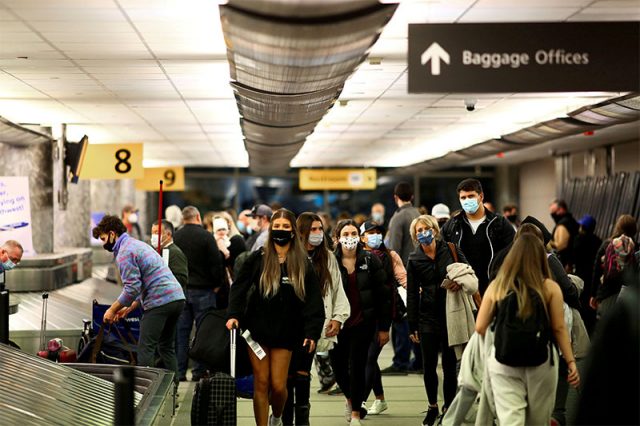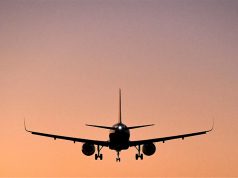
WASHINGTON — The United States in November will re-open for air travelers from 33 countries including China, India, Brazil and most of Europe who are fully vaccinated against COVID-19, the White House said on Monday, easing tough pandemic-related travel restrictions imposed beginning early last year.
The decision, announced by White House coronavirus response coordinator Jeff Zients, marked an abrupt shift for President Joe Biden’s administration, which last week said it was not the right time to lift any restrictions amid rising COVID-19 cases.
The United States had lagged many other countries in lifting such restrictions, and allies including Britain and Germany welcomed the move. The U.S. restrictions have barred travelers from most of the world including tens of thousands of foreign nationals with relatives or business links in the United States.
Restrictions on non-U.S. citizens were first imposed on air travelers from China in January 2020 by then-President Donald Trump and then extended to dozens of other countries, without any clear metrics for how and when to lift them.
The United States will admit fully vaccinated air travelers from the 26 so-called Schengen countries in Europe including France, Germany, Italy, Spain, Switzerland and Greece, as well as Britain, Ireland, China, India, South Africa, Iran and Brazil. The existing policy has barred non-U.S. citizens who were in those countries within 14 days.
Zients did not give a precise start date beyond saying “early November.”
Separately on Monday, the United States extended its pandemic-related restrictions at land borders with Canada and Mexico that bar nonessential travel such as tourism through Oct. 21, while giving no indication if it would apply the vaccine rules to those borders.
The United States has allowed foreign air travelers from more than 150 countries throughout the pandemic. Its action on Monday means that new COVID-19 vaccine requirements will now apply to nearly all foreign nationals flying to the United States – including those not subject to the prior restrictions.
Critics had said that the U.S. travel restrictions no longer made sense because some countries with high COVID-19 rates were not on the restricted list while some countries on the list have the pandemic more under control.
Americans traveling from abroad who are not vaccinated will face tougher rules than vaccinated citizens, including needing to show proof of a negative COVID-19 test within a day of travel and proof of purchasing a viral test to be taken after arrival.
Air travel restrictions and bans were imposed by many countries in a bid to slow the spread of COVID-19, devastating international travel and tourism and shaking the airline industry.
The U.S. Chamber of Commerce business group praised the U.S. announcement, saying “allowing vaccinated foreign nationals to travel freely to the United States will help foster a robust and durable recovery for the American economy.” Airlines for America, an industry trade group, said that through late August, international air travel was down 43% from pre-pandemic levels.
Shares in U.S. airlines were little changed while some European carriers gained. British Airways parent IAG SA rose about 11% while Air France-KLM and Deutsche Lufthansa AG were both up about 5%.
British Airways CEO and Chairman Sean Doyle said the news “marks an historic moment and one which will provide a huge boost to Global Britain as it emerges from this pandemic.”
British Prime Minister Boris Johnson called the announcement “a fantastic boost for business and trade, and great that family and friends on both sides of the pond can be reunited once again.” Germany’s U.S. ambassador, Emily Haber, welcomed the announcement, writing on Twitter: “Hugely important to promote people-to-people contacts and transatlantic business.”
Biden, who makes his first U.N. General Assembly speech on Tuesday, hosts leaders from Britain, India, Japan and Australia this week.
Which vaccines?
The White House said federal health authorities will decide which vaccines qualify, including if those not approved by U.S. regulators will be acceptable. Foreign nationals will need to present proof of vaccination before travel and will not be required to quarantine upon arrival.
Exceptions to the vaccine policy include children not yet eligible for shots. Reuters reported on Aug. 5 the White House was developing vaccine entry requirements that could cover nearly all foreign air visitors.
The U.S. Travel Association trade group previously estimated that the U.S. restrictions, if they ran to the end of the year, would cost the American economy $325 billion in total losses and 1.1 million jobs.
Airlines heavily lobbied the White House to lift the restrictions, but failed to get them lifted in time for the summer travel season.
Trump in January issued an order to lift restrictions on 27 European countries, but it was blocked by Biden before taking effect. Biden also added India and South Africa to the restricted list.
Zients said on Sept. 15 that given the rise of the Delta variant, it was not the right time to lift travel restrictions. Asked on Monday what changed since then, Zients cited rising global vaccinations, adding: “The new system allows us to implement strict protocols to prevent the spread of COVID-19.”
Zients said the new system will include collecting contact tracing data from passengers traveling into the United States to enable the CDC to contact travelers exposed to COVID-19.
—Reporting by David Shepardson and Andrea Shalal; additional reporting by Sarah Young Editing by Franklin Paul, Will Dunham and Heather Timmons









